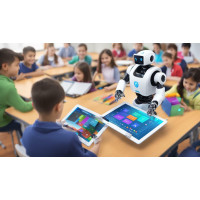Exploring How AI can be used as a tool for Learning

As technology continues to advance, artificial intelligence (AI) is becoming increasingly integrated into the field of education. In the United States, educators are exploring the potential of AI as a tool to enhance the learning experience for students. From personalized learning journeys to intelligent tutoring systems, AI-powered learning tools are revolutionizing the way we teach and learn.
Key Takeaways:
- AI is being explored as a tool for learning in the US education system.
- AI-powered learning tools offer personalized learning experiences.
- AI can provide learner support through adaptive feedback and recommendations.
- Ethical considerations, such as data privacy and algorithmic bias, must be addressed in the use of AI in education.
- The future of AI in education holds potential for advancements in virtual reality simulations and intelligent tutoring systems.
The Benefits of AI in Education
AI offers numerous advantages when it comes to learning in an educational setting. With the help of AI-based educational tools, students can experience personalized learning experiences tailored to their individual needs and learning styles. AI-powered learning platforms can adapt to a student's progress, providing real-time feedback and recommendations to enhance their understanding and retention of information.
Enhancing learning with AI goes beyond personalization. It also facilitates engagement by creating interactive and immersive learning environments. Virtual tutors, for example, use AI algorithms to interact with students, answering questions and guiding them through the learning process. This not only improves comprehension but also fosters a supportive and interactive learning experience.
AI-powered learning tools have the potential to revolutionize education by making it more accessible, engaging, and effective.
Efficient assessment methods are another benefit of incorporating AI in education. AI can analyze large amounts of data, such as student performance and assessment results, to identify patterns and trends. This allows educators to gain valuable insights into student progress and tailor instruction accordingly. Additionally, AI can automate tasks such as grading, freeing up valuable time for teachers to focus on providing individualized support and guidance.
As AI continues to advance, its role in education will only grow. It has the potential to transform traditional learning techniques, providing students with real-time feedback, facilitating collaboration, and enabling immersive learning experiences. By integrating AI into the learning process, educators can create progressive strategies that leverage data-driven decision-making, adaptive curriculum design, and intelligent learning analytics.
Benefits of AI in Education:
- Personalized learning experiences
- Enhanced engagement and interactivity
- Efficient assessment methods
- Real-time feedback and recommendations
- Facilitation of collaboration
- Immersive learning experiences
- Data-driven decision-making
- Adaptive curriculum design
- Intelligent learning analytics
What are the benefits of artificial intelligence in education? How can AI be used to enhance the learning process and improve educational outcomes? These are some of the questions that we will explore in this blog post.
One of the main advantages of using AI in education is that it can create immersive learning experiences. Using AI technology, educators can create virtual or augmented reality environments that simulate real-world scenarios. This can be used to teach concepts in a more hands-on and interactive way. For example, students can be placed in a virtual laboratory where they can experiment with different chemicals and observe the results. Or they can be placed in a historical simulation where they can experience what it was like to live in that time period.
Another benefit of AI in education is that it can help educators to make data-driven decisions. By collecting data on student performance, AI systems can provide insights into areas where students are struggling and identify trends over time. This information can be used to inform curriculum design and to tailor instruction to the needs of individual students.
AI can also be used to create adaptive curriculum. Using machine learning, AI systems can identify gaps in a student's knowledge and provide targeted content to help them close those gaps. This type of adaptive learning is particularly useful for students who are struggling with a particular subject.
Finally, AI can be used to provide intelligent learning analytics. By tracking how students interact with educational content, AI systems can generate recommendations for how to improve the learning experience. For example, if a student is consistently skipping over a particular section of a textbook, the system might recommend adding more content on that topic or providing a different type of explanation.
Overall, the benefits of AI in education are vast. By enhancing learning experiences, increasing data-driven decision-making, and providing adaptive and intelligent learning tools, AI has the potential to transform the way we learn and improve educational outcomes for all students.
AI-powered Learning Tools
With the help of AI-powered learning tools, students can benefit from personalized and interactive learning experiences. These innovative tools utilize artificial intelligence to adapt to each student's unique needs, enhancing the effectiveness of education in the US. One such tool is the virtual tutor, which provides personalized guidance and support to students, helping them navigate challenging concepts and providing instant feedback on their progress. This interactive form of learning engages students in a way that traditional teaching methods cannot.
Another AI-powered learning tool gaining popularity is the adaptive learning platform. This platform uses machine learning algorithms to analyze a student's performance and tailor the curriculum accordingly. It adjusts the difficulty level of assignments and provides additional resources to address areas where the student may be struggling. By catering to the individual needs of each learner, these platforms facilitate a more efficient and effective learning process.
Intelligent content creation tools are also revolutionizing the way educational materials are developed. These tools utilize AI technologies, such as natural language processing, to analyze and generate educational content. They can quickly analyze vast amounts of information and create custom learning materials, tailored to different learning styles and preferences. This enables educators to provide engaging and personalized content to their students, enhancing their understanding and retention of the subject matter.
Table: AI-powered Learning Tools
| Tool | Function |
|---|---|
| Virtual Tutor | Provides personalized guidance and feedback to students |
| Adaptive Learning Platform | Adjusts curriculum based on individual student performance |
| Intelligent Content Creation Tool | Analyzes and generates custom learning materials |
In conclusion, AI-powered learning tools have the potential to transform education in the US. Through personalized guidance, adaptive curriculum, and intelligent content creation, these tools cater to the individual needs of each learner. By harnessing the power of artificial intelligence, students can engage in interactive and effective learning experiences, ultimately enhancing their academic performance.
Artificial intelligence for learning
Artificial intelligence for learning is a field of research that explores how artificial intelligence (AI) technology can be used as a tool for learning. AI technology has the potential to revolutionize the field of education by providing new ways for students to learn and by helping educators to personalize instruction.
There is a growing body of evidence that suggests that AI technology can be used to improve learning outcomes. For example, one study found that AI-based tutoring systems can help students to learn more effectively. Another study found that AI technology can be used to identify students who are at risk of dropping out of school.
AI technology can be used in a variety of ways to support learning. For example, AI-based learning environments can provide students with personalized feedback and recommendations. AI technology can also be used to create virtual reality experiences that can help students to learn more effectively.
It is important to note that AI technology is still in its early stages of development and there is much we do not yet know about how it can be used to support learning. However, the potential of AI technology to improve learning outcomes is very exciting and we are only beginning to scratch the surface of what is possible.
AI solutions offer valuable support to learners by providing personalized guidance and feedback based on their individual needs. With the advancements in AI technologies, educational institutions and online learning platforms are integrating AI-powered tools to enhance the learning experience.
One of the key benefits of AI in education is its ability to analyze vast amounts of data and make data-driven recommendations. For example, AI-powered tutoring systems can analyze a student's performance and provide targeted feedback and recommendations for improvement. These systems can identify areas where a student is struggling and suggest additional resources or exercises to address their specific learning gaps.
AI can also play a crucial role in adaptive learning. By continuously monitoring a student's progress and performance, AI algorithms can dynamically adjust the learning materials and pace to ensure optimal engagement and understanding. This personalized approach helps learners stay motivated and maximizes their learning outcomes.
Furthermore, AI tools can facilitate learner support by providing real-time assistance. Chatbots can be integrated into learning platforms to answer students' questions and provide immediate support, similar to having a virtual tutor available 24/7. Additionally, AI can automate administrative tasks, such as grading assignments or providing feedback on multiple-choice quizzes, freeing up time for educators to focus on personalized interaction and deeper learning engagement with their students.
| Benefits of AI Solutions for Learner Support: |
|---|
| 1. Personalized guidance and feedback 2. Data-driven recommendations 3. Adaptive learning experiences 4. Real-time assistance through chatbots 5. Automation of administrative tasks |
Case Study: AI-powered Tutoring System
"Using an AI-powered virtual tutor has significantly improved student performance in our math classes. The system analyzes each student's strengths and weaknesses, providing targeted exercises to reinforce their learning. The personalized feedback has been invaluable in helping students grasp difficult concepts and achieve higher scores on assessments. Our teachers have also reported a reduction in administrative burden, allowing them to focus on individualized instruction and building strong student-teacher relationships." - Principal, XYZ School
In summary, AI solutions in education offer a wide range of benefits for learner support. From personalized guidance and feedback to adaptive learning experiences and real-time assistance, AI tools enhance the learning journey and improve educational outcomes. While AI is not a substitute for human educators, it complements their expertise and enables a more individualized, efficient, and engaging learning experience.
Role of ai in learning
It is no secret that artificial intelligence (AI) is reshaping how we live and work. We are starting to see AI technology in our everyday lives, from the Siri on our iPhones to the algorithms that select the news stories we see on Facebook. As AI technology continues to evolve, its potential applications are increasingly diverse and significant. This is especially true when it comes to education and learning.
There are a number of ways that AI can be used as a tool for learning. For example, AI can be used to create personalized learning experiences. Imagine a learning platform that is able to not only assess a learner's current level of understanding, but also identify gaps in their knowledge. This platform could then provide targeted content and resources to help the learner close those knowledge gaps. This is just one example of how AI can be used to create a more tailored and effective learning experience.
In addition to personalized learning, AI can also be used to enhance collaboration and peer-to-peer learning. For example, AI technology can be used to identify patterns in how students work together on projects. This information can then be used to provide students with targeted feedback and suggestions on how they can improve their collaborative skills. AI can also be used to create virtual learning environments that allow students to interact with each other and with content in new and innovative ways.
Finally, AI can also be used to assess learning outcomes. For example, AI-based assessment tools can be used to provide objective and data-driven feedback on student performance. This type of feedback can be extremely helpful for both students and teachers as it can identify areas of strengths and weaknesses and help guide future instruction.
While there are many potential applications for AI in education, it is important to remember that AI is just a tool. It is up to educators to decide how best to use AI technology to support their students' learning.
| Benefits of AI in Learning Techniques: |
|---|
| Real-time feedback for targeted interventions |
| Collaborative platforms for interactive learning |
| Immersive experiences through VR and AR applications |
Progressive Strategies in AI-enhanced Learning
Educators are adopting progressive strategies to leverage AI's potential and enhance the learning experience for students. By integrating AI-based educational tools into their teaching methods, educators are able to personalize instruction, improve student engagement, and facilitate knowledge retention.
One progressive strategy is the use of adaptive learning platforms. These platforms utilize AI algorithms to analyze students' performance data and provide personalized recommendations for further study. By identifying each student's strengths and weaknesses, adaptive learning platforms can create tailored learning paths that address individual needs, ensuring more effective learning outcomes.
Benefits of Adaptive Learning Platforms:
- Personalized learning paths based on individual student needs
- Real-time feedback and progress tracking
- Enhanced student engagement through interactive content
Another progressive strategy is the integration of intelligent content creation tools into the curriculum. These tools use AI to generate interactive learning materials, such as quizzes, simulations, and virtual reality experiences. By providing students with immersive and hands-on learning opportunities, these tools promote active learning and deeper understanding of the subject matter.
"Intelligent content creation tools have transformed the way we deliver instruction. Students are now able to engage with the content in a more interactive and dynamic way, which greatly enhances their learning experience." - John Smith, Educator
Furthermore, intelligent tutoring systems have been proven to be effective in providing personalized support to students. These systems use AI to analyze students' performance data and deliver adaptive feedback and guidance. By addressing specific areas of difficulty, intelligent tutoring systems help students overcome challenges and improve their overall learning outcomes.
As educators continue to explore the potential of AI in education, these progressive strategies are paving the way for a more adaptive and personalized learning experience. By leveraging AI-based educational tools, educators can empower students to achieve their full potential and thrive in the digital age.
| Benefits of AI-enhanced Learning: | Examples of AI-based Educational Tools: |
|---|---|
|
|
Ethical Considerations in AI-assisted Learning
While AI offers numerous benefits in education, it also raises important ethical considerations that must be carefully addressed. As schools and institutions increasingly integrate AI-based educational tools into their learning environments, it is crucial to ensure that the use of AI is aligned with ethical guidelines and safeguards.
One key ethical consideration is data privacy. AI often relies on collecting and analyzing large amounts of personal data from students, including their learning patterns, preferences, and progress. It is essential that educators and developers prioritize the security and privacy of this data, taking steps to ensure that it is handled in a responsible and transparent manner. Transparent communication with students and their families about data collection and usage is vital to maintain trust and protect individual privacy.
Another ethical consideration is the potential for algorithmic bias. AI systems are trained using vast amounts of data, which can include biases and prejudices present in society. These biases can inadvertently be perpetuated by AI algorithms, leading to unfair treatment and discrimination. To mitigate this risk, it is crucial to regularly evaluate and update AI algorithms, ensuring they are designed to be inclusive, unbiased, and fair. Employing diverse and inclusive datasets during training can help mitigate algorithmic biases and promote equal opportunities for all learners.
Table: Ethical Considerations in AI-assisted Learning
| Ethical Consideration | Explanation |
|---|---|
| Data Privacy | Ensuring the responsible handling and protection of student data, with transparent communication and consent. |
| Algorithmic Bias | Addressing biases in AI algorithms to prevent unfair treatment and discrimination. |
| Transparency | Providing clear explanations of how AI tools are being used and their impact on learning outcomes. |
| Accountability | Establishing guidelines and mechanisms to hold AI systems and their developers accountable for any unintended consequences. |
In addition, transparency is crucial in AI-assisted learning. Students, parents, and educators should have a clear understanding of how AI tools are being used and how they impact learning outcomes. Clear explanations and communication about the limitations, strengths, and potential biases of AI systems can contribute to informed decision-making and foster trust in the technology.
Lastly, accountability plays a vital role in ensuring ethical AI use. Establishing guidelines and mechanisms to hold AI systems and their developers accountable for any unintended consequences is essential. This includes addressing issues like algorithmic errors, providing channels for feedback and reporting, and continually monitoring and evaluating the impact of AI on learners and the educational system as a whole.
The Future of AI in Education
The future of education is likely to be heavily influenced by further advancements in AI technology. Artificial intelligence has already made significant contributions to the field of education, with the development of AI-powered learning tools and educational systems that enhance learning experiences for students. As technology continues to evolve, we can expect AI to play an even larger role in transforming the way we learn and acquire knowledge.
One area where AI is expected to have a significant impact is personalized learning. AI-powered learning tools can analyze individual student data, such as learning preferences and performance, to tailor educational content and activities to their specific needs. This personalized approach allows students to learn at their own pace and focus on areas where they need the most support, ultimately leading to improved learning outcomes.
Furthermore, AI can revolutionize the assessment process by providing efficient and accurate methods of evaluating student progress. Machine learning algorithms can analyze large volumes of data, such as test scores and performance metrics, to generate comprehensive reports on student performance. This enables educators to identify areas of improvement and provide targeted interventions to help students succeed.
| Benefits of AI in Education: |
|---|
| Personalized learning experiences |
| Enhanced engagement |
| Efficient assessment methods |
The Role of AI in Creative Learning Experiences
In addition to personalized learning, AI can also support creative learning experiences for students. AI-powered tools can generate personalized learning materials, such as interactive simulations or virtual reality experiences, that foster creativity and innovation. These tools can also facilitate collaboration among students, allowing them to work together on creative projects and receive real-time feedback on their artistic endeavors.
"AI-powered tools can generate personalized learning materials, foster creativity, and facilitate collaboration among students."
However, as we look towards the future of AI in education, it is important to consider the ethical implications of its use. Data privacy, algorithmic bias, and transparent decision-making processes are some of the ethical considerations that need to be addressed to ensure that AI is used responsibly and for the benefit of all learners.
In conclusion, the future of education will be shaped by the continued advancements in AI technology. AI-powered learning tools, personalized learning experiences, efficient assessment methods, and support for creative learning are just some of the ways in which AI can enhance the educational landscape. It is crucial to embrace these advancements while also addressing the ethical considerations to ensure that AI is used in a responsible and inclusive manner.
AI's Role in Creative Learning Experiences
AI is not only transforming traditional learning methods but also playing a role in fostering creativity and innovation among students. By harnessing the power of AI-powered learning tools, students can explore their potential in various creative fields and receive personalized guidance and support.
One area where AI is making a significant impact is in generating personalized learning materials. Through advanced algorithms, AI can analyze the learning preferences, strengths, and weaknesses of individual students and generate tailored content to suit their needs. This personalized approach allows students to engage in a more meaningful way with the subject matter, enhancing their creativity and critical thinking abilities.
Collaboration is a crucial aspect of creative learning, and AI tools can facilitate this process. AI-powered platforms enable students to connect with peers who have similar creative interests, fostering collaboration and knowledge sharing. Additionally, these platforms can provide real-time feedback on creative projects, helping students refine their ideas and push their creative boundaries.
Furthermore, AI can enhance the feedback loop in artistic endeavors. By analyzing artistic techniques, styles, and historical context, AI can provide valuable insights and suggestions for improvement. This enables students to experiment with different approaches and refine their artistic skills, leading to enhanced creativity and innovation.
| Benefits of AI in Creative Learning Experiences |
|---|
| Personalized learning materials tailored to students' needs |
| Facilitation of collaboration among students with similar creative interests |
| Real-time feedback and suggestions for improvement in artistic endeavors |
In summary, AI is revolutionizing creative learning experiences by providing personalized learning materials, facilitating collaboration, and offering valuable feedback in artistic endeavors. By harnessing the power of AI, students can unlock their creative potential and develop innovative skills that will benefit them in the future.
Conclusion
As AI continues to evolve, its role in education is expanding, offering innovative solutions to enhance learning experiences in the US. The benefits of AI in education are evident, with personalized learning experiences, enhanced engagement, and efficient assessment methods. AI-powered learning tools, such as virtual tutors, adaptive learning platforms, and intelligent content creation tools, are revolutionizing the way students learn and interact with educational content.
AI also provides valuable support to learners through personalized recommendations, adaptive feedback, and intelligent tutoring systems. By incorporating AI into traditional learning techniques, such as providing real-time feedback, facilitating collaboration, and enabling immersive learning experiences, educators can create a more dynamic and effective learning environment.
However, ethical considerations must be taken into account when utilizing AI in education. Concerns related to data privacy, algorithmic bias, and transparent decision-making processes need to be addressed to ensure the responsible use of AI-powered learning tools.
The future of AI in education holds great potential, with advancements such as virtual reality simulations, intelligent tutoring systems, and personalized learning journeys on the horizon. Additionally, AI tools can support creative learning experiences by generating personalized learning materials, facilitating collaboration in creative projects, and providing real-time feedback on artistic endeavors.
In conclusion, AI has the power to transform education by providing innovative solutions that enhance learning experiences. With careful consideration of ethical implications and continued research and development, AI can revolutionize how students learn and thrive in the US education system.
FAQ
Q: How can AI be used as a tool for learning in the US?
A: AI can be used in education to provide personalized learning experiences, enhance engagement, and improve assessment methods.
Q: What are the benefits of AI in education?
A: The benefits of AI in education include personalized learning experiences, enhanced engagement, and efficient assessment methods.
Q: What are some AI-powered learning tools available in the market?
A: AI-powered learning tools include virtual tutors, adaptive learning platforms, and intelligent content creation tools.
Q: How can AI provide support to learners?
A: AI can provide support to learners through personalized recommendations, adaptive feedback, and intelligent tutoring systems.
Q: How does AI impact learning techniques?
A: AI enhances traditional learning techniques by providing real-time feedback, facilitating collaboration, and enabling immersive learning experiences.
Q: What are some progressive strategies in AI-enhanced learning?
A: Progressive strategies in AI-enhanced learning include data-driven decision-making, adaptive curriculum design, and intelligent learning analytics.
Q: What are some ethical considerations in AI-assisted learning?
A: Ethical considerations in AI-assisted learning include data privacy, algorithmic bias, and transparent decision-making processes.
Q: What does the future of AI in education look like?
A: The future of AI in education includes advancements such as virtual reality simulations, intelligent tutoring systems, and personalized learning journeys.
Q: How can AI support creative learning experiences?
A: AI tools can support creative learning experiences by generating personalized learning materials, facilitating collaboration in creative projects, and providing real-time feedback on artistic endeavors.
Q: What is the conclusion regarding AI as a tool for learning in the US?
A: AI has the potential to revolutionize education by offering personalized learning experiences, enhancing various learning techniques, and supporting creative learning experiences. However, ethical considerations and careful implementation are necessary for its successful integration into the education system.
Source Links
Tags: AI tools for Educators
Related Articles
AI tools for Teachers
Discover the top 7 AI tools for teachers in 2023, enhancing teaching methods and boosting student engagement. Maximize your teaching potential today!
Read MoreHow is AI Useful for Kids?
Discover how AI is useful for kids. Dive into the numerous benefits and impacts of AI on child development, education, and more. Explore with us today.
Read MoreBuilding an AI That Teaches Itself
ive into AI development: Learn to build a self-teaching artificial intelligence system. Your guide through principles & strategies for autonomous learning.
Read MoreUnraveling the Puzzle: How do you use AI tools in the classroom?
Unlock the power of AI in education! Discover innovative ways to integrate artificial intelligence tools into your classroom, enhancing learning experiences.
Read MoreUsing AI to Create Engaging Presentations
Learn how to use AI technology to create compelling and engaging presentations quickly and easily.
Read MoreRevolutionize Teaching with our AI Lesson Plan Generator
Experience a seamless lesson preparation with our AI lesson plan generator. Tailor-made, efficient and innovative teaching solutions for the modern educator.
Read More





